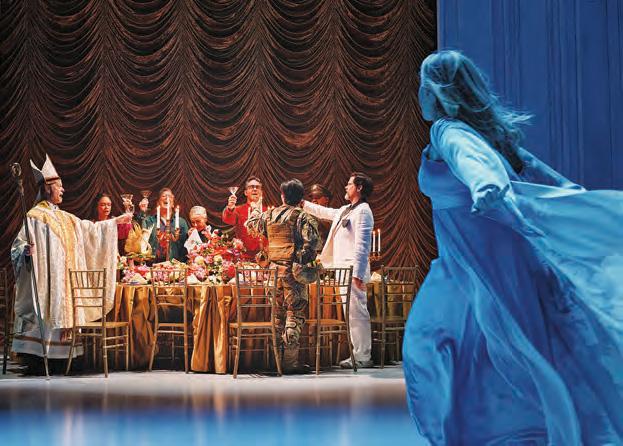
UNLIKE AN ORWELL or an Odets, the cheekily (and correctly) self-described "icon of the American musical theater" Stephen Sondheim is not ordinarily associated with overt political righteousness. Yet what Orwell called "a sense of injustice" flows through Sondheim's work-sometimes as a quiet underground stream, sometimes as a heaving, filthy flood. "What does a man do, when at last he realizes his suffering is caused not by the cruelty of fate but by the injustice of his fellow human beings?" asks the anarchist Emma Goldman in Sondheim and John Weidman's Assassins. So although it's not a surprise, it's still an invigorating relief that Sondheim's final offering to the world, the long-time-coming new musical Here We Are, is fittingly complex and thorny. The same seething consciousness of caste and cruelty that ripples through Assassins and Sweeney Todd forms the backbone of Here We Are, a show with, if anything, even more of an impulse to eat the rich. There's no blurring of the composer-lyricist's inimitable agile and angular forms, no blunting of his wit, no comfort in nostalgia. The play has sharp, savage urges. When it wobbles, and it does so increasingly as it goes along, it's because the logical conclusion of its premise is so dark, so extreme, that you can feel the more ambivalent instinct of the show's creators to look for alternative exits.
Esta historia es de la edición November 06 - 19, 2023 de New York magazine.
Comience su prueba gratuita de Magzter GOLD de 7 días para acceder a miles de historias premium seleccionadas y a más de 8500 revistas y periódicos.
Ya eres suscriptor ? Conectar
Esta historia es de la edición November 06 - 19, 2023 de New York magazine.
Comience su prueba gratuita de Magzter GOLD de 7 días para acceder a miles de historias premium seleccionadas y a más de 8500 revistas y periódicos.
Ya eres suscriptor? Conectar

Our Campus.Our Crisis.
Inside the encampments and crackdowns that shook American politics.

Middle Management
A 40-something woman undergoes asexual awakening in Miranda July’s thrilling new work.

Return to Guantánamo
Serial dusts off American terror's old machinery.

Chekhov, Misfiring
An Uncle Vanya that’s all talk.

The Art World's Pot Stirrer Returns
Maurizio Cattelan’s first solo gallery show in more than 20 years is a provocative commentary on America’s ills.

On Normani's Time
Five years into her solo career, the pop star's debut album is finally imminent. She's not sorry for the wait.

French Quarter Seafood in Fort Greene
Lots of oysters and fillets of fish inspired by Nobu at Strange Delight.

Where Does the Wine Bar End and the Restaurant Begin?
Pét-nats, pan roasts, and a lobster on the loose at Penny and Demo.

Trial-and-Error Arcadia
Kitty Hawks and Larry Lederman's Chappaqua gardens have been a three-decade-long journey.

The Trash and Treasures of Temu
How are these headphones 4.98? And everything else you've wondered about the chaotic new Everything Store.